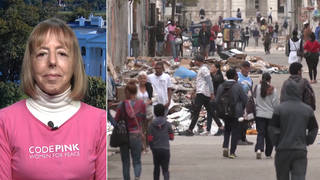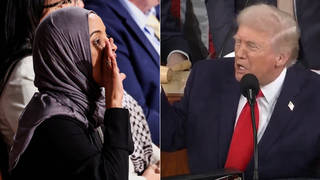
The Trump administration is escalating its campaign against international students at U.S. colleges and universities, announcing that it will begin “aggressively” revoking the visas of Chinese students, in addition to freezing visa processing for all foreign-born students as it prepares to require additional social media vetting for every applicant. “It’s really just difficult for me to think of any conceivable theory on which this is going to help the United States,” says Jameel Jaffer, noting that international students pay a disproportionate share of tuition costs on U.S. campuses. Jaffer is the director of the Knight First Amendment Institute, which has previously sued the government over its social media vetting policy for visa applications. The policy, which began as a pilot program during the Obama administration, “is ineffective at identifying national security threats, but it is very effective at chilling free speech,” says Jaffer.
Jaffer also comments on the high-profile immigration detention of former Columbia student Mahmoud Khalil and Harvard graduate researcher Kseniia Petrova, as well as a case brought by the Knight Institute challenging the constitutionality of the Trump administration’s crackdown on campus pro-Palestine protest.
Transcript
NERMEEN SHAIKH: Secretary of State Marco Rubio warned the government will start “aggressively” revoking the visas of Chinese students, one day after the Trump administration announced it’s halting the processing of visas for foreign students as it prepares to require additional social media vetting for every applicant. Rubio said students with links to the Chinese Communist Party, which is China’s sole and ruling party, would be especially targeted, as well as people studying in, quote, “critical fields.” Chinese nationals represent the second-largest proportion of overseas students in the U.S.
Meanwhile, President Trump told reporters Wednesday, Harvard should cap its acceptance of international students at “around 15 percent.” Last week, Trump revoked Harvard’s certification for admitting overseas students. Currently over a quarter of Harvard’s student body is international. Many of those students are now seeking to transfer to another school.
Harvard’s commencement ceremonies are taking place today. This week, Harvard students protested in support of international students. This is Pakistani international student Abdullah Shahid Sial, who is also the student body co-president of Harvard’s Undergraduate Association.
ABDULLAH SHAHID SIAL: I haven’t had the time yet to think about my backup plans, but as of now, I don’t think anyone is sure if they can return for the fall semester back into Harvard, and, more broadly, back into the U.S. In that case, I would have to look for other options. I haven’t looked at the list yet for the next available ones, because most transfer windows for most colleges have already been closed. But I also want to make it very, very clear that deporting international students doesn’t solve any of this. We don’t have any provided mechanism by President Trump’s administration that deporting internationals in this particular manner will solve any of these issues.
AMY GOODMAN: This comes as a federal judge in New Jersey found the Trump administration’s efforts to deport Columbia graduate, Palestinian activist Mahmoud Khalil is likely unconstitutional, but stopped short of ordering his release from a Jena, Louisiana, immigration jail.
In another high-profile case targeting international students and academics, a judge has granted bail to Russian Harvard scientist Kseniia Petrova, ruling her three-months-long detention by immigration authorities is unjustified.
For more, we’re joined by Jameel Jaffer, director of the Knight First Amendment Institute at Columbia University, part of a team of lawyers representing professors in their lawsuit against the Trump administration’s repression of students and faculty involved in pro-Palestine activism. He was previously the ACLU’s deputy legal director.
Jameel, welcome back to Democracy Now! It’s great to have you with us.
JAMEEL JAFFER: Thank you. Great to be here.
AMY GOODMAN: This attack on students at Columbia, at Harvard, around the country, and now the latest news that broke in the last hours about going after, in particular, Chinese students, the second-largest number of students in the United States, well over a quarter of a million students — can you just respond to what’s happening here?
JAMEEL JAFFER: Well, I mean, I really don’t think any foreign enemy could do nearly as much damage to the United States as the Trump administration is doing to it right now. I mean, even this policy alone, the one focused on Chinese students, is going to have an immediate effect, not just on the Chinese students who are already here, but on the willingness of Chinese nationals to come to the United States. That’s obviously the whole point of it.
But, you know, Chinese nationals who study in the United States bring a lot to the United States. I mean, it’s a wonderful, amazing thing that people come from all over the world to study at American universities. You know, they enrich the experiences of American students at those universities. They pay tuition. They contribute to research collaborations. They engage in all sorts of socially useful projects that have implications not just for students and faculty at the universities, but for American society. It’s an amazing thing.
And the Trump administration is taking aim at — you know, at all of that. And it’s going to have immediate and, I’m afraid, irreparable consequences for American leadership and prosperity. It’s really just difficult for me to think of any conceivable theory on which this is going to help the United States.
NERMEEN SHAIKH: And if you could respond also to the fact that the Trump administration has announced a pause in the processing of visas for all foreign students, and that it’s done so at this time when the maximum number of students from abroad are applying for visas for September admissions? And just to make clear, there are over a million international students from over 200 countries enrolled in U.S. colleges. That was the case, the numbers, for 2023-2024.
JAMEEL JAFFER: Yeah. I mean, let me just start by saying this is so incredibly cruel to the — you know, for the people who are here, this is so disruptive, right? They have relied on the fact that they were given visas by the State Department. They are here lawfully. They are studying here at the invitation of the United States. And this is designed to disrupt their lives in the most fundamental way.
But then, beyond that, it’s going to be such a big deal for these universities, because foreign students make up a very high percentage of the students at major American universities. I don’t have the exact numbers in front of me, but I believe it’s something close to 40% at Columbia and somewhere around 25% at Harvard. And foreign students pay a disproportionate share of the tuition. So, universities in the United States are reliant on the income they get from the foreign students who study here. And it’s going to be a huge deal for American universities when all of these students who are studying here lawfully find it necessary to consider withdrawing, and all the students who would otherwise apply to the United States end up applying to, you know, Canada or Australia or Europe instead.
NERMEEN SHAIKH: Well, I’d like to go to comments made by Secretary of State Marco Rubio during a Senate hearing, the Senate Committee on Foreign Relations, earlier this month. He said the Trump administration would continue to reconsider granting international student visas.
SECRETARY OF STATE MARCO RUBIO: If you tell me that you’re coming to the United States to lead campus crusades, to take over libraries and burn down — try to burn down buildings and acts of violence, we’re not going to give you a visa.
SEN. CHRIS VAN HOLLEN: Is that what Ms. Öztürk did?
NERMEEN SHAIKH: So, Jameel, that was Secretary of State Marco Rubio. If you could speak specifically about the Trump administration’s justification for this? In other words, they’re looking to expand social media vetting for every applicant. And also the fact that in his last administration, Trump already imposed a stricter review of visa applicants, including social media screening.
JAMEEL JAFFER: Yeah.
NERMEEN SHAIKH: So, first of all, why wasn’t that reversed during the Biden administration?
JAMEEL JAFFER: Good question.
NERMEEN SHAIKH: Is it difficult to do so?
JAMEEL JAFFER: Yeah, good question.
NERMEEN SHAIKH: And, yeah, yeah, what kind of social media screenings are we looking at?
JAMEEL JAFFER: Yeah, so, this screening has been in place now for — you know, a pilot version of it was put in place under the Obama administration. It’s been expanded since then, principally by the Trump administration. It applies now to — about 14 million people who apply for visas every year are required to submit their social media handles to the State Department with their visa application. And now the Trump administration is proposing to expand it even — you know, even further.
The evidence we have is that this program has been entirely ineffective at achieving the ends that the Trump administration says it was designed to achieve. The goal was to identify national security threats. There is no evidence at all that this program has resulted in the identification of national security threats. And in fact, my organization, the Knight Institute, sued several years ago under the Freedom of Information Act to find out how this program was actually operating and what the results of the program had been. And one of the documents we got in response to our FOIA request was a document from inside the director of national intelligence — the Office of the Director of National Intelligence, conceding that the program had been “ineffective.” That was their word, “ineffective.” And now this program is going to be expanded.
Now, it is ineffective at identifying national security threats, but it is very effective at chilling free speech and association, that is protected by the First Amendment. And there is an ongoing lawsuit. We’re involved in a lawsuit on behalf of two documentary film organizations, Doc Society and the International Documentary Association. We sued over the constitutionality of this program several years ago. The case is now pending before the D.C. Circuit.
NERMEEN SHAIKH: And what about —
AMY GOODMAN: So —
NERMEEN SHAIKH: Why wasn’t — sorry, just one second — the Biden administration, why wasn’t this reversed during all those years?
JAMEEL JAFFER: So, we repeatedly asked the Biden administration to reverse this policy. The Brennan Center, which we are working with on this specific issue, repeatedly asked the Biden administration to reverse this policy. And the Biden administration did not do that.
AMY GOODMAN: So, you’re a graduate of Harvard Law School. Actually, you were an international student from Canada at the time.
JAMEEL JAFFER: I was. That’s right.
AMY GOODMAN: You work at Columbia University. By the way, the latest news out of Harvard is they’re not only going to go after the students, but anyone, they will be reviewing the visa, who is involved there. But we just heard Marco Rubio talking about troublemakers, essentially, going after them and cleaning — now it’s a new rule, whether you live in another country or here, and you’re leaving the country, you’ve got to pack your bags, clean your room and clean all your social media sites — right? — to help get back into this country.
JAMEEL JAFFER: Yeah.
AMY GOODMAN: I want to ask about Mahmoud Khalil. He’s a Columbia student, now a graduate. He’s imprisoned. He graduated while he was imprisoned in Louisiana, negotiator between the students and Columbia University around the encampments. And then you have a judge ruling — a New Jersey federal judge ruling that it is likely unconstitutional, what has happened to him. And you have a Vermont federal judge calling for the release on bail of a student — Harvard scientist named Kseniia Petrova, who came into the United States and was taken by ICE and is jailed. Can you respond to these cases and the message they are sending and what has to happen here?
JAMEEL JAFFER: Yeah. I mean, let me start with the Khalil case. So, this was an important legal victory that Khalil won yesterday before Judge Farbiarz in New Jersey. And Khalil is very well represented. He has great lawyers at the ACLU and the Center for Constitutional Rights. And I think that that legal victory is something to celebrate.
But at the end of the day, he is still behind bars. You know, it’s been almost three months, and he is still behind bars. And on the basis of what? Activity that is plainly protected by the First Amendment. You know, he’s behind bars because of his human rights advocacy. And I think that, you know, that is a really incredible and shocking thing. If the First Amendment was supposed to prevent anything, it was supposed to prevent the government arresting you on the basis of your political beliefs. But that’s what’s going on here. And he has been detained for three months already. I think it’s kind of, you know, crazy that it’s already gone on for so long. And I hope that Judge Farbiarz gets to the First Amendment questions very quickly.
NERMEEN SHAIKH: And also, just to be clear, he’s not a foreign student. He is a green card holder —
JAMEEL JAFFER: That’s right.
NERMEEN SHAIKH: — a lawful permanent resident of the United States. And then, to ask about the Russian scientist who’s at Harvard University, who was, she’s also been detained —
JAMEEL JAFFER: Yeah.
NERMEEN SHAIKH: — in this Louisiana ICE detention facility for months. Now, in her case, she’s also been criminally charged, in addition to violating immigration laws. She didn’t declare these lab frogs, I mean, that she had brought in from France, which is normally considered a trivial violation. She’s been criminally charged for smuggling, for bringing in these frogs, but the Trump administration has also issued a detainer on immigration charges, which effectively means that even if she’s granted bail, what the judge yesterday ordered — if she’s granted bail on the criminal case, the government —
JAMEEL JAFFER: Yeah.
NERMEEN SHAIKH: — could still get ICE to detain her. If you could elaborate?
JAMEEL JAFFER: Yeah, I mean, it’s a very unusual reaction on the part of the government to what, as you say, is usually considered a trivial offense. I think the message here is — I mean, just, you know, beyond the kind of arbitrariness of it and the cruelty of it, the message here is not just to, you know, her specifically, but to any foreign national who’s considering coming to the United States right now. Like, the message is you’re not welcome. And, you know, you see that message delivered through all of these policies — the one that we started with, the policy relating to Chinese nationals, the roundup of students who protested on campus last year, the revocation of Harvard’s authority to host foreign students. Like, all of this is meant to send a broader message, which is that, you know, foreign nationals aren’t welcome in the United States.
And, you know, that is deeply problematic for many of those foreign nationals, but it is also extremely damaging to the United States at every level, you know, from security to the economy, to American prestige in the world, to our ability to carry out scientific projects that have very real implications for ordinary Americans. You know, it’s not just people at Harvard who get cancer or who get Alzheimer’s. It’s ordinary Americans get these diseases, and they need cures to these diseases. And the research is being done at major American universities, and it will be much harder to that research without foreign faculty and foreign students.
AMY GOODMAN: And the rule of the courts? We just heard about the Vermont judge —
JAMEEL JAFFER: Yeah.
AMY GOODMAN: — the New Jersey judge. Overall, your assessment of them? And the Trump administration, how it’s responding first term versus this term? You have Stephen Miller, you just heard —
JAMEEL JAFFER: Yeah, yeah.
AMY GOODMAN: — saying this is a judicial coup, when they are ruled against.
JAMEEL JAFFER: Yeah. I think that, you know, many of the district court judges are doing exactly what the Constitution demands they do. You know, the district court judges are ruling against the Trump administration in many of these — many of these contexts.
We’ll have to see what the Supreme Court does. You know, the Supreme Court so far has been extremely cautious. You know, one theory is that they’re worried about the Trump administration not complying with their court orders, and they’re worried about the loss of institutional credibility that would come if the Trump administration ignored their court orders. But that’s itself a kind of terrifying thing, that we’re, you know, at the point where the Supreme Court is worried about whether the executive branch will even honor the Constitution in that way.
NERMEEN SHAIKH: And if we could ask you about the case that you, yourself — you’re representing, the Knight Institute is representing the American Association of University Professors and the Middle East Studies Association, challenging the Trump administration’s large-scale arrests, detentions and deportations of foreign students and faculty who have been involved in pro-Palestine protests. If you could talk about that case?
JAMEEL JAFFER: Yeah. So, this is a challenge to the policy of arresting, detaining and threatening to deport students who participated in pro-Palestinian protest last year. You know, as we’ve already discussed, there are cases in which individual students who have been targeted have challenged their arrest and detention and threatened deportation. The Mahmoud Khalil case is one of those cases. But this case is a challenge to the deeper policy, and it’s brought on behalf of faculty at universities across the country.
And what they are pointing out is that these detentions have obvious implications for the students who are detained, but they also have this very profound chilling effect on all of the foreign students and foreign faculty, who are worried about the possibility of being targeted. And this policy has really transformed life at universities around the country, really put a kind of blanket of fear and repression over these — you know, over campuses all over the United States.
AMY GOODMAN: And just 30 seconds on — this is often being framed as what these international students lose when they can’t come to the United States. But the issue of what the United States loses? I mean, it’s called a “brain drain.” Other countries are now calling this a “brain gain,” that they’ll get the students. But the shutting down of scientific labs, the research around Alzheimer’s, around cancer?
JAMEEL JAFFER: Yeah. I mean, I think it’s obvious what’s going to happen. The most talented students and faculty from abroad, who, until, you know, very recently, have come to the United States, will instead go to Europe, or they’ll go to Australia, or they’ll go to Canada. And all of those countries —
AMY GOODMAN: Or China or Russia.
JAMEEL JAFFER: Or China. And they’ll — you know, all those countries are seeing this as a huge opportunity, as I suppose they should. But it’s very sad for the United States, because the United States, since the Second World War, has really led in higher education. You know, these universities — Harvard, Columbia, Stanford — these are the envy of the world, you know? And like I said earlier, I just cannot imagine the theory, any theory, under which these policies are good for the United States at any level.
AMY GOODMAN: Jameel Jaffer, director of the Knight First Amendment Institute at Columbia University.
Coming up, we look at Israel’s use of Palestinians as human shields in Gaza and the West Bank. We’ll talk to Nadav Weiman, a former Israeli soldier who heads the group Breaking the Silence. Back in 20 seconds.
[break]
AMY GOODMAN: “Contra Todo,” “Against Everything,” by Ileana Cabra Joglar, better known as iLe, performing in our Democracy Now! studio.












Media Options